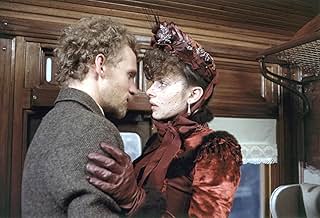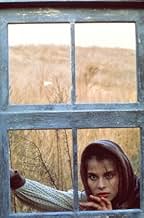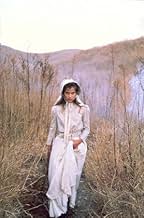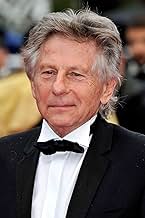A strong-willed young peasant girl attracts the affection of two men.A strong-willed young peasant girl attracts the affection of two men.A strong-willed young peasant girl attracts the affection of two men.
- Won 3 Oscars
- 16 wins & 17 nominations total
Nastassja Kinski
- Tess
- (as Nastassia Kinski)
Storyline
Did you know
- TriviaThe film's opening dedication at the start of the film states: "For Sharon". Roman Polanski dedicated this movie to his late wife, Sharon Tate, who was killed in 1969 by the Manson Clan. Before Tate's death, she had read the film's source novel by Thomas Hardy and was convinced that her husband would one day make a great film based on the novel. Movie was released to the theaters exactly 10 years after her untimely death.
- GoofsAt the beginning of the final sequence, set at Stonehenge, someone's head can be seen at bottom-left.
- Alternate versionsThe film was first released to German cinemas uncut with a running time of 184 minutes. As the audience reaction was far from overwhelming the distributor decided to re-cut and re-release the film in a more "accessible" 134 minutes version. But at least one of the original prints had survived and was shown here at the local art house years later.
- ConnectionsFeatured in The 38th Annual Golden Globe Awards (1981)
Featured review
I don't know what's been keeping them but 'Tess' has been overdue for a DVD release for a very long time. At last it's here, and it looks gorgeous, although it hasn't been digitally cleaned up and there are a couple of scratches here and there. It's been worth the wait though, as this is possibly the most beautifully photographed film ever made.
Ever since the release of '2001: A Space Odyssey' I have been fascinated by the work of Stanley Kubrick and his cinematographer on that film, Geoffrey Unsworth. 'Tess' was Unsworth's last work; he died during the filming, and shared his Oscar for this with Ghislain Cloquet, who finished shooting, copying Unsworth's own style. The lighting is subtle and appears beautifully natural: just look at the first five minutes starting with village club dancers walking to the field, John Durbeyfield's fateful meeting with the parson, the arrival of Tess' future husband Angel Clare, with the late summer afternoon shading gradually into evening and darkness and all before we have even identified which girl is Tess. Oh, and that stunning moment when Tess finds her confessional letter to Angel has slipped under the carpet of his room unread, and her stunned realisation is underlined by the wheeling camera shot and the blinding flaring of the sun behind her head suddenly wiping all else off the screen for a moment. Wonderful.
Do yourself a favour and look up Geoffrey Unsworth on the internet movie database the number, quality and range of films he contributed to is astonishing. By all accounts he was a lovely man too, the featurettes underline the terrific camaraderie that existed on the shoot between all the cast and crew, and it is really moving to hear their tributes and memories of Unsworth, particularly Nastassia Kinski fighting back tears as she recalls his death.
In the film, of course, Kinski is absolutely wonderful, just perfect for the role of tragic victim Tess, the 'pure woman' of Hardy's subtitle. Despite comments to the contrary I find her accent quite a commendable attempt at Dorset, having lived and worked there myself, and my wife having been born there. Some of the other accents are generalised country yokel, but Kinski has learned a pretty authentic representation of Dorset's rolling rounded vowels.
I'm also a Hardy fan, and Tess is quite possibly my favourite novel. I remain astonished that Polanski was so successful in transferring it to the screen. The featurettes make it clear the main task of literary adaptation for the screen is cutting things out, yet when I first saw the film I couldn't think of a thing that was missing. That's impossible of course, but the choice of what to film and what to leave out is almost seamless. Perhaps the only serious omission is the passage in the book where Tess feels guilt for inadvertently causing the death of the family horse in a night-time collision with the post-cart, and it is to assuage this guilt that she agrees to visit 'cousin' Alec, which is of course her great undoing. Polanski tried to cut the film to meet the expectations of distributors (and Francis Ford Coppola!) but some idea of his reluctance comes from the disclosure that he took 3 months to cut 20 minutes. I'd love to see a director's cut with that footage restored.
Finally, the background material reveals the bone-headiness of some of those involved in film distribution. The co-producer shows the film to the buyers of the two main IK distributors, and (pre-Oscars) one of them says 'This film will only show in my cinemas over my dead body.' Doesn't that remind you of Decca turning down The Beatles?
Ever since the release of '2001: A Space Odyssey' I have been fascinated by the work of Stanley Kubrick and his cinematographer on that film, Geoffrey Unsworth. 'Tess' was Unsworth's last work; he died during the filming, and shared his Oscar for this with Ghislain Cloquet, who finished shooting, copying Unsworth's own style. The lighting is subtle and appears beautifully natural: just look at the first five minutes starting with village club dancers walking to the field, John Durbeyfield's fateful meeting with the parson, the arrival of Tess' future husband Angel Clare, with the late summer afternoon shading gradually into evening and darkness and all before we have even identified which girl is Tess. Oh, and that stunning moment when Tess finds her confessional letter to Angel has slipped under the carpet of his room unread, and her stunned realisation is underlined by the wheeling camera shot and the blinding flaring of the sun behind her head suddenly wiping all else off the screen for a moment. Wonderful.
Do yourself a favour and look up Geoffrey Unsworth on the internet movie database the number, quality and range of films he contributed to is astonishing. By all accounts he was a lovely man too, the featurettes underline the terrific camaraderie that existed on the shoot between all the cast and crew, and it is really moving to hear their tributes and memories of Unsworth, particularly Nastassia Kinski fighting back tears as she recalls his death.
In the film, of course, Kinski is absolutely wonderful, just perfect for the role of tragic victim Tess, the 'pure woman' of Hardy's subtitle. Despite comments to the contrary I find her accent quite a commendable attempt at Dorset, having lived and worked there myself, and my wife having been born there. Some of the other accents are generalised country yokel, but Kinski has learned a pretty authentic representation of Dorset's rolling rounded vowels.
I'm also a Hardy fan, and Tess is quite possibly my favourite novel. I remain astonished that Polanski was so successful in transferring it to the screen. The featurettes make it clear the main task of literary adaptation for the screen is cutting things out, yet when I first saw the film I couldn't think of a thing that was missing. That's impossible of course, but the choice of what to film and what to leave out is almost seamless. Perhaps the only serious omission is the passage in the book where Tess feels guilt for inadvertently causing the death of the family horse in a night-time collision with the post-cart, and it is to assuage this guilt that she agrees to visit 'cousin' Alec, which is of course her great undoing. Polanski tried to cut the film to meet the expectations of distributors (and Francis Ford Coppola!) but some idea of his reluctance comes from the disclosure that he took 3 months to cut 20 minutes. I'd love to see a director's cut with that footage restored.
Finally, the background material reveals the bone-headiness of some of those involved in film distribution. The co-producer shows the film to the buyers of the two main IK distributors, and (pre-Oscars) one of them says 'This film will only show in my cinemas over my dead body.' Doesn't that remind you of Decca turning down The Beatles?
- How long is Tess?Powered by Alexa
Details
- Release date
- Countries of origin
- Language
- Also known as
- Cô Gái Đức Hạnh
- Filming locations
- Morienval, Oise, France(final scenes, Stonehenge reconstitution)
- Production companies
- See more company credits at IMDbPro
Box office
- Budget
- $12,000,000 (estimated)
- Gross US & Canada
- $20,093,330
- Gross worldwide
- $20,101,247
- Runtime3 hours 6 minutes
- Color
- Aspect ratio
- 2.35 : 1
Contribute to this page
Suggest an edit or add missing content



































